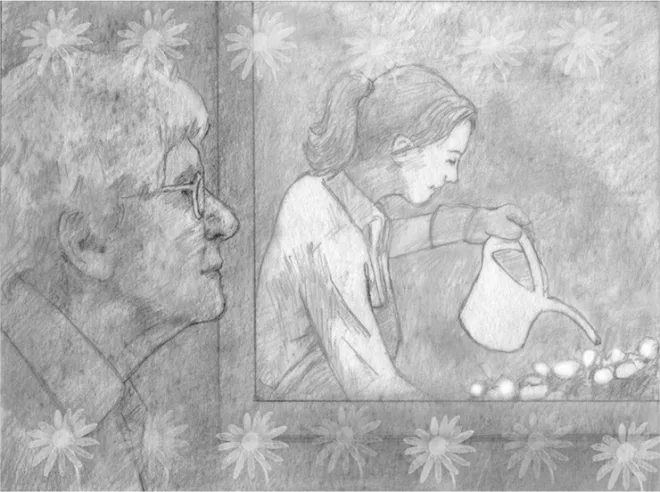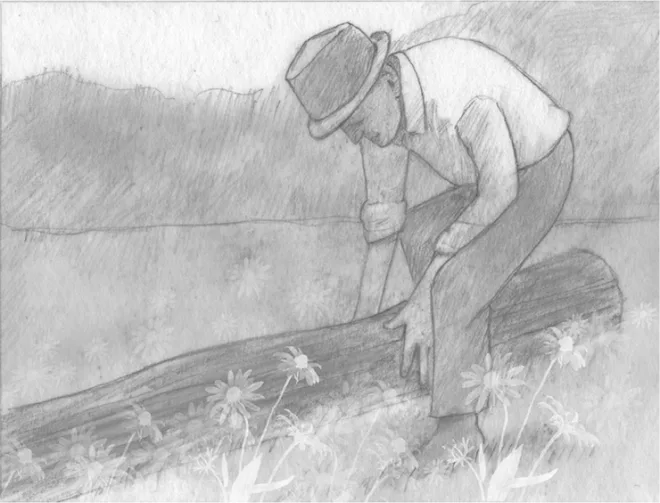As soon as I shut off the engine, Mom grabbed the handle and shoved against the car door.
“Hey, hold on a minute,” I said. Too late. Arms pumping, curls bouncing, my mother hurried through the gate of her favorite garden nursery, her idea of paradise. I dropped the keys into my purse and started my pursuit. By the time I reached the entrance, she was already manhandling her little red nursery wagon around a water feature, little pink pots of gerbera daisies jostling behind like toddlers in the kiddie pool.
It was an April day in the Florida panhandle—my Mama’s 82nd birthday—and we intended to celebrate it in total horticultural immersion.
Following in the wake of her wagon, I watched her squinting at tags, shuffling around display benches, listening for the siren whisper, “Pick me. Pick me.” And she did—oh, she did. She dropped a fluttery-eyed gaura into the cart, then a fiery red pelargonium, followed by a brimstone-colored zinnia. As my mother had grown older, her floral taste had ratcheted from pale lavenders to murderous oranges, from sedate pinks to reds bold enough to make one blush. Where I would have chosen the misty blue agapanthus barely budded in its container, Mom grabbed a mustard-colored pot stuffed with screaming cerise poppies—in full hussy bloom.
Mom’s cart now billowed in a prism of oranges, reds, pinks, yellows, and all shades purple. Then we stepped across the threshold of the potting shed, where brewed the real magic—shelf upon shelf of paper packets rustling with seeds. Every spring Mom mixed her special potion of gomphrena, zinnia, marigold, and rudbeckia—especially rudbeckia—casting them like spells over her garden. Come September, the phone would ring and my father’d be sure to say, “You ought to see your Mama’s black-eyed Suzies!” Taller than my mother, backlit by a setting sun, filtered through a marsh of singing pines and tall cypress, they were quite the sight.

When we finally got back in the car, Mom appeared sated, her treasures cascading over the back seat of my Mini. At the house, the rest of the family waited with birthday cake and a bucket of the Colonel’s regular recipe. We rode home, Mom patting the blowsy pink head of Sarah Bernhardt that peeked over her shoulder, me slapping at the Elsa Spath that nibbled at my ear.
Suddenly I glanced over to find Mom’s eyes wide in horror. “Oh Bobbie, I never meant to pick so many. You bought me way too much. I was just greedy.”
“Mom. It’s your birthday.” I smiled. If she but knew, I’d dance with the devil for a hundred more days like this one.
Hours later—the cake reduced to crumbs, ice cream melted to soup—I sat back on my haunches, exhausted, watching Mom still grubbing away in her garden, tucking her new babies in.
More than a year passed. On a Florida day soupy with humidity, my sister and I escorted Mom through the gates of Maclay Gardens for its annual Festival of Flowers.
Inside the entrance, at a stand of crepe myrtles at the forking paths, we sized up the choices—reflection pool or secret garden, azalea walk or walled garden. Carla turned to ask, “Mom, which way…” and stopped. Behind us, on a bench beneath the arms of an ancient oak, Mom sat, her hands folded, her head bowed. I felt a lurch in my universe. Looking at my sister, I knew she did, too.
We headed back to Mom. As we drew closer, she raised her head and smiled. “Oh, ya’ll go on. I’ll just sit here for a while.”
We looked without seeing that day. Both of us knew Mom expected us to take our time, so we did, but we picked up our pace on the way back. We found Mom deep in the flowerbeds, snapping seed heads and dropping them into her pockets, committing a little gardening larceny.
What a relief—the world seemed normal again.
Alas, it wasn’t. By December, I’d made the ten-hour trip from my Tennessee home to Mom’s Florida one nine times. The first of the nine had followed my sister’s call: “I found her just sitting inside in the dark. And outside the sun was shining.”
More and more, I’d become the one who tended her garden, deadheading her roses, taking extra care with Penelope—a special gift from her first-born grandchild—while she watched from the kitchen window. This trip home, I didn’t pull into the driveway and step onto a screened porch wrapped in jasmine. I did not sit down to Mama’s creamed corn and lima beans. Their house was dark as I passed, only Dad’s ripening satsumas glowing in the late light of evening, like the ghosts of Christmas past.
From the hospital elevator, I could see my father sitting in the waiting room, feet side by side. He held the cap he seldom removed in his broken hands, looking like a little boy—lost.
“Hi, Dad.” I bent to hug him, his shoulders fragile as bird’s wings inside the circle of my arms. When did I become bigger than my father? I left him with Barry, my sister’s husband, still there after 12 long hours, to go to my mother. Before I left, I asked Dad if he needed anything.

“I just want to see your Mama digging in her garden again. That’s all.”
I took him home that night to rest. The next morning I woke early to tend my mother’s garden. I ripped away the grass invading her daylilies and tore at the bindweed choking her hydrangeas. I slashed back the wisteria swamping the back porch, hoping I was being as savage as Mom would be.
His cough alerted me, and I turned to see Dad stooping to build little piles out of the wreckage I’d left. Oh, Lord, I thought. He looked so fragile. “Dad, I can do this. Go sit on the porch. I’ll get you another cup of coffee.”
Five minutes later, he was off the porch and raking pine straw around Mom’s circle of azaleas. Snagging his boots on a Muscadine vine, he stumbled against a birdhouse. Looking at the splinter protruding from his thumb, he reached for his pocketknife.
“Dad!” I saw his shoulders stiffen. Well, so did mine.
As I weeded from one bed to the next, Dad’s shadow passed across the rudbeckia patch. I looked up to see him wrestling a pine log big enough to take him five falls out of five.
“Dad!” That’s all we needed, him breaking a leg, or worse, and ending up in the hospital, too. “Dad, will you please stop being a horse’s behind!”
“Danged thing’s a-laying on the Black-Eyed Suzies! And this horse’s behind is a-moving it off!” But his struggle proved futile, his opponent too obstinate. Back bowed from 70 years of hard work, little more than skin and bone, he slumped onto the log.
“I just wanted to help.” He looked around him and saw her pots standing empty for the first time in memory. “So she won’t have to do anything but dig in her flowers. When she comes home.”
Shame washed over me, and I knelt at his feet. “Oh Dad. I’m so sorry. Please, let’s do it together.” We pulled. We kicked. We screamed. That old log didn’t stand a chance.
Throughout the days that followed, we all—my sister, my brother, our spouses (extra children in our parents’ hearts), and their precious grandchildren, and I—listened to Dad’s heartache. In the lonely hours after midnight, roused by the caring hands of hospice staff, he’d whisper, “Please God, can I have her back, digging in her garden.” My sister and I held the final vigil, together, singing our mother’s favorite hymns—“I’ll Fly Away” and “Amazing Grace.” We held her hands, our faces resting against hers on the pillow, little girls again.
My mother left us on Valentine’s Day. Three weeks and one day later, so did Dad.
For Mom, roses the color of an April morning filled their small church. For Dad, the small-town florist did her best with gerbera daisies dipped in sunshine.
They looked just like black-eyed Susans. ❖
This article was published originally in 2017, in GreenPrints Issue #109.




Precious story. Thank you.